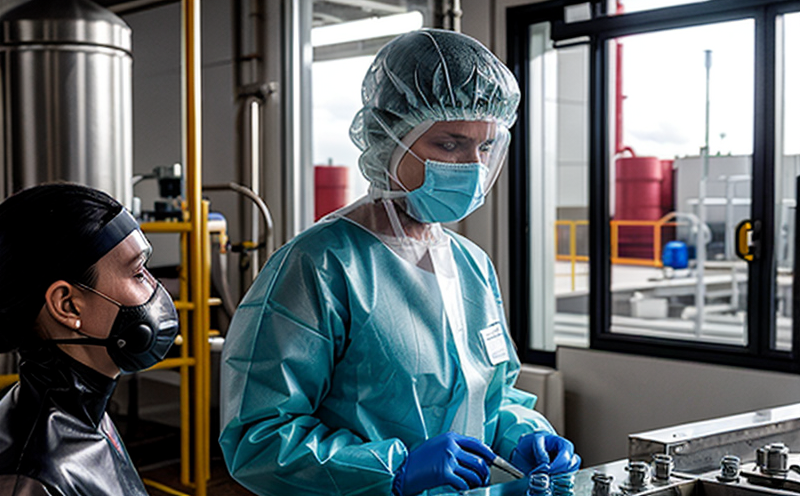
-
Chemical Safety and Certification-
Chemical Safety in Manufacturing Processes-
Chemical Safety Protocols in Manufacturing
We provide comprehensive solutions designed to help our clients mitigate risks, enhance performance, and excel in key areas such as quality, health & safety, environmental sustainability, and social responsibility.
Discover
For many years, our organization has been operating successfully, boasting modern laboratories that meet international standards. These laboratories are equipped with the latest technology devices and equipment, and we have built a strong team of experienced and trained personnel to operate them.
DiscoverWelcome to Eurolab, your partner in pioneering solutions that encompass every facet of life. We are committed to delivering comprehensive Assurance, Testing, Inspection, and Certification services, empowering our global clientele with the ultimate confidence in their products and processes.
Discover
-
Chemical Safety and Certification-
Chemical Safety in Manufacturing Processes-
Chemical Safety Protocols in ManufacturingIn manufacturing industries, the use of chemicals is a fundamental aspect of many processes. However, improper handling, storage, and disposal of chemicals can lead to serious health risks, environmental damage, and operational disruptions. To ensure a safe working environment and compliance with regulations, manufacturers must implement robust chemical safety protocols. These protocols are designed to mitigate hazards, protect workers, and reduce the environmental impact of chemical use.
This article delves into essential chemical safety protocols for manufacturers, the importance of these protocols, and how they can be effectively implemented.
Chemical safety protocols are vital in manufacturing environments where workers are frequently exposed to hazardous chemicals. These chemicals can include solvents, acids, bases, heavy metals, and other substances that, if mishandled, can cause health problems or environmental contamination. Ensuring proper safety practices in chemical handling and storage is essential for preventing accidents, legal penalties, and reputational damage.
1. Worker Protection
2. Environmental Sustainability
3. Legal and Regulatory Compliance
To ensure comprehensive chemical safety, manufacturers should implement a series of protocols that cover the entire lifecycle of chemicals, from receipt to disposal. Below are the core elements of an effective chemical safety program:
1. Risk Assessment and Chemical Inventory
2. Proper Labeling and Signage
3. Personal Protective Equipment (PPE)
4. Safe Chemical Handling Procedures
5. Chemical Storage and Segregation
6. Spill Response and Emergency Procedures
7. Chemical Waste Disposal
8. Training and Awareness Programs
Adopting comprehensive chemical safety protocols in manufacturing has several benefits:
1. Improved Worker Health and Safety
2. Compliance with Regulatory Requirements
3. Environmental Protection
4. Increased Operational Efficiency
Chemical safety protocols are an essential component of manufacturing operations that ensure the health and safety of workers, protect the environment, and ensure regulatory compliance. By implementing comprehensive safety measures, from hazard assessments and PPE to spill response and waste disposal, manufacturers can create a safer and more efficient workplace. These protocols also demonstrate a commitment to sustainability and social responsibility, ultimately enhancing the manufacturer’s reputation and long-term success.

Fire Safety and Prevention Standards
Fire Safety and Prevention Standards: Protecting Lives and Property Fire safety and prevention stan...

Transportation and Logistics Certification
Transportation and Logistics Certification: A Comprehensive Guide The transportation and logistics ...

Environmental Simulation Testing
Environmental Simulation Testing: A Comprehensive Guide In todays world, where technology is rapidl...

Renewable Energy Testing and Standards
Renewable Energy Testing and Standards: Ensuring a Sustainable Future The world is rapidly transiti...

Industrial Equipment Certification
Industrial equipment certification is a critical process that ensures industrial equipment meets spe...

Construction and Engineering Compliance
Construction and Engineering Compliance: Ensuring Safety, Quality, and Regulatory Adherence In the ...

Healthcare and Medical Devices
The Evolution of Healthcare and Medical Devices: Trends, Innovations, and Challenges The healthcare...

Consumer Product Safety
Consumer Product Safety: Protecting Consumers from Harmful Products As a consumer, you have the rig...

Pressure Vessels and Installations Testing
Pressure Vessels and Installations Testing Pressure vessels are a critical component of various ind...

Military Equipment Standards
Military Equipment Standards: Ensuring Effectiveness and Safety The use of military equipment is a ...

NEBS and Telecommunication Standards
Network Equipment Building System (NEBS) and Telecommunication Standards The Network Equipment Bu...

Agricultural Equipment Certification
Agricultural equipment certification is a process that ensures agricultural machinery meets specific...

Trade and Government Regulations
Trade and government regulations play a vital role in shaping the global economy. These regulations ...

Environmental Impact Assessment
Environmental Impact Assessment: A Comprehensive Guide Environmental Impact Assessment (EIA) is a c...

MDR Testing and Compliance
MDR Testing and Compliance: A Comprehensive Guide The Medical Device Regulation (MDR) is a comprehe...

Pharmaceutical Compliance
Pharmaceutical compliance refers to the adherence of pharmaceutical companies and organizations to l...

Electromechanical Safety Certification
Electromechanical Safety Certification: Ensuring Compliance and Protecting Lives In todays intercon...

Electrical and Electromagnetic Testing
Electrical and Electromagnetic Testing: A Comprehensive Guide Introduction Electrical and electrom...

Railway Industry Compliance
Railway Industry Compliance: Ensuring Safety and Efficiency The railway industry is a critical comp...

Lighting and Optical Device Testing
Lighting and Optical Device Testing: Ensuring Performance and Safety Lighting and optical devices a...

Automotive Compliance and Certification
Automotive Compliance and Certification: Ensuring Safety and Efficiency The automotive industry is ...

Battery Testing and Safety
Battery Testing and Safety: A Comprehensive Guide As technology continues to advance, battery-power...

IT and Data Center Certification
IT and Data Center Certification: Understanding the Importance and Benefits The field of Informatio...

Hospitality and Tourism Certification
Hospitality and Tourism Certification: Unlocking Opportunities in the Industry The hospitality and ...

Energy and Sustainability Standards
In today’s rapidly evolving world, businesses face increasing pressure to meet global energy a...

Chemical Safety and Certification
Chemical safety and certification are critical in ensuring the safe management of products and proce...

Aviation and Aerospace Testing
Aviation and Aerospace Testing: Ensuring Safety and Efficiency The aviation and aerospace industr...

Food Safety and Testing
Food Safety and Testing: Ensuring the Quality of Our Food As consumers, we expect our food to be sa...

Product and Retail Standards
Product and Retail Standards: Ensuring Quality and Safety for Consumers In todays competitive marke...

Cosmetic Product Testing
The Complex World of Cosmetic Product Testing The cosmetics industry is a multi-billion-dollar ma...